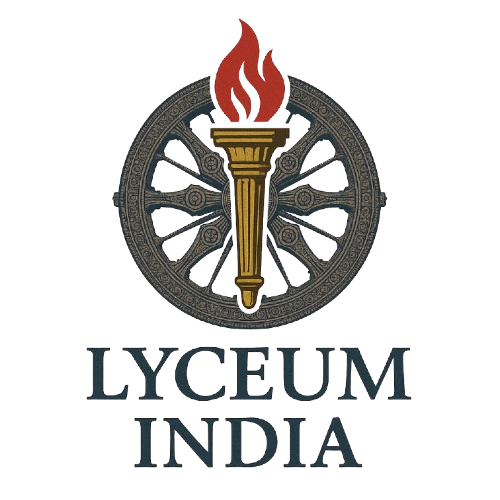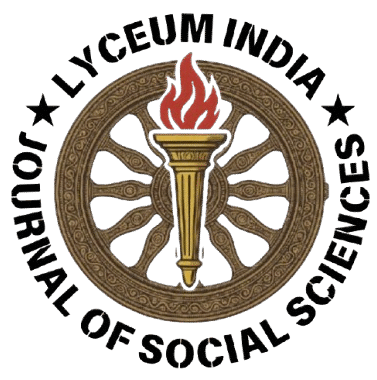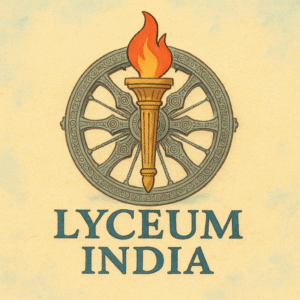Lyceum India Journal of Social Sciences ISSN: 3048-6513 (Online)
Volume: 2 \ Issue: 1 (MAY 2025)
Article 1
| Title: | Agriculture at Cross-Roads in the undivided Kalahandi of the KBK Need to Look in the fresh Perspective | |
| Author(s) | Dr. Padma Lochan Barma | |
| Pages | 1-16 | Unique DOI: 10.5281/zenodo.15491281 |
| Abstract: | Agriculture in the undivided Kalahandi region of Odisha, part of the KBK (Kalahandi-Bolangir-Koraput) belt, remains in a state of deep crisis. Despite substantial agricultural potential, the region suffers from systemic challenges such as erratic rainfall, inequitable land distribution, poor irrigation infrastructure, and exploitative market practices. Field studies reveal persistent poverty, marginalization of Scheduled Tribes and Castes, and failures in land reform implementation. The study emphasizes that climatic factors, coupled with policy neglect and globalization pressures, have worsened rural distress leading to farmer suicides and forced migration. A re-evaluation of agrarian policies, focusing on equitable land access, infrastructure development, and sustainable farming practices, is urgently needed to secure the livelihoods of millions dependent on agriculture. | |
| Keywords: | Kalahandi, agriculture crisis, land reforms, farmer exploitation, irrigation, climate change | |
| Certificate | ||
Size: 358kb
115 Downloads
Article 2
| Title: | An Introspection of Transgender People’s Rights in India | |
| Author(s) | Dr. Nuki Gammeng & Ms. Libi Nyodu | |
| Pages | 17-26 | Unique DOI: 10.5281/zenodo.15491385 |
| Abstract: | Transgender individuals in India are often stereotypically depicted as men wearing women’s clothing, engaging in street-based begging. Commonly used terms to describe them include Hijra, Kinnar, Chakka, Kothi, Shiv-Shakti, and Aravani, among others. Unfortunately, transgender people face significant deprivation of basic rights, which has a detrimental impact on their well-being and the welfare of their community. This has resulted in the transgender population becoming one of the most marginalized and disadvantaged groups in society. This study aims to examine the entitlements of transgender individuals and critically analyse the deficiencies within the existing legal framework that addresses transgender issues in India. | |
| Keywords: | Transgender, Gender Identity, Transgender Rights, Constitution, The Transgender Persons (Protection of Rights) Act, 2019 | |
| Certificate | ||
Size: 251kb
92 Downloads
Article: 3
| Title: | Civil society’s role in democratizing governance an analysis of the Soochana Adhikar Abhijan movement in Odisha | |
| Author(s) | Baishampayan Sunani | |
| Pages | 27-32 | Unique DOI: 10.5281/zenodo.15491445 |
| Abstract: | Civil society is the fulcrum of today’s democratic polity. It strengthens and sustains the democratic fabric of society. In fact, we cannot think of a democracy today without active involvement of civil society groups in the decision-making process and governance. In other words, for democratic politics and governance to prevail, the existence of civil society organisations is inevitable. This paper explores the interplay between civil society and state in the context of the Soochana Adhikar movement in Odisha and underscores its significant role in democratising the governance process by promoting citizens participation, transparency and accountability in the state administration. It also briefs the institutional aspects of this grouping by analysing its structures, functions, and role in managing the movement. Then it proceeds to highlight the challenges faced by the activists and argues that a robust civil society is essential for building a vibrant democracy that fosters citizens’ engagement and holds the government accountable. | |
| Keywords: | Civil Society, Citizens, Governance, Democracy, Transparency, Accountability | |
| Certificate | ||
Size: 509kb
87 Downloads
Article: 4
| Title: | Educational and Career Aspirations among Young Females in Aalo, West Siang & Arunachal Pradesh | |
| Author(s) | Mani Shankar Singh & Sudip Chatterje | |
| Pages | 33-42 | Unique DOI: 10.5281/zenodo.15491528 |
| Abstract: | This study digs into the educational and career aspirations of young females aged 15–24 in Aalo, West Siang District, Arunachal Pradesh. It emphasizes on different kinds of challenges they face varying from inadequate infrastructure and challenging terrain to social, cultural and economic impediments based upon interviews and group discussions with 200 participants. The study attempts to show the importance of focused actions such as infrastructural development, extending financial assistance, mentorship, and community awareness programs. It contributes to the discussions on gender and education with special reference to insights and solutions especially suited to development studies in hilly and remote regions. | |
| Keywords: | Educational aspirations, Career choices, Gender and education, youth empowerment. | |
| Certificate | ||
Size: 417kb
105 Downloads
Article: 5
| Title: | From Starvation to A Justiciable Right- Realizing the Role of Public Interest Litigation in Redefining Right to Food in India | |
| Author(s) | Pooja Naik Gaonkar | |
| Pages | 43-48 | Unique DOI: 10.5281/zenodo.15491582 |
| Abstract: | India has long reflected a culture grounded in empathy and social responsibility, where hunger has been addressed through both age-old customs and present-day grassroots initiatives. The idea that “no one should go to bed hungry” is not merely a sentiment but a foundational principle that guides the nation’s conscience. Over time, the Right to Food has transformed from a moral obligation into a legal entitlement, signifying a significant shift in socio-economic rights. This change has been largely influenced by Public Interest Litigations (PILs), which have led the judiciary to reinterpret Article 21 of the Indian Constitution. The courts have progressively expanded the meaning of the “right to life” to include not just survival, but a life with dignity, thereby recognizing food as a fundamental component of this right. Instead, it now includes the entitlement to essential conditions for a dignified life—such as access to adequate nutrition. This judicial development has significantly influenced both legal interpretations and public policy, affirming that a life of dignity necessarily requires fulfilment of basic human needs, including proper nourishment. By transforming starving India from a systematic failure to providing Indians democratized access to food, the country has honoured and operationalized its cultural ethos of feeding the hungry in both symbolic and practical ways. This paper explores the critical role played by PIL in defining and institutionalizing the Right to Food security in India. It further reflects on the legislative challenges encountered in implementation of policy legislations and a need of vigilant, collective yet reflective efforts from the stakeholders towards upholding Right to Food as a living right. | |
| Keywords: | Food Security, Constitution, Judiciary, PIL, Fundamental right | |
| Certificate | ||
Size: 558kb
78 Downloads
Article: 6
| Title: | Role of Indian diaspora navigating opportunities and obstacles | |
| Author(s) | Dr. Amrita Jaiswal | |
| Pages | 49-56 | Unique DOI: 10.5281/zenodo.15491598 |
| Abstract: | The term ‘Diaspora’ refers to the displacement of an individual, community or groups of people from the original homeland to an alien territory. A country’s Diaspora, and the Diasporas it hosts, can be a huge asset for its development. In the 21st century the Indian government has taken various positive steps to foster reconnection between India and its Diaspora. Indian Diaspora based on their knowledge, expertise and skill can really contribute in a constructive way in the development and the growth of the country. The present paper attempts to understand and explore the concept of diaspora, reviews government policies, and analyses benefits and challenges of diaspora engagement. | |
| Keywords: | Diaspora, Migration, Soft Power, Brain Drain, Brain Gain | |
| Certificate | ||
Size: 755kb
98 Downloads
Article: 7
| Title: | The Reimposition of Protected Area Regime (PAR) Reasons, Implications and Challenges | |
| Author(s) | Dr. Lalmuana Guite | |
| Pages | 57-64 | Unique DOI: 10.5281/zenodo.15491621 |
| Abstract: | On the 17th December, 2024, the Ministry of Home Affairs (MHA) reimposed the Protected Area Regime (PAR) in the states of Manipur, Nagaland, and Mizoram. The PAR was introduced under the Foreign (Protected Area) order, 1958 for all areas falling between ‘Inner Line’ and the international border in the states of Arunachal Pradesh, Jammu & Kashmir, Manipur, Mizoram, Nagaland, Rajasthan, Sikkim and Uttarakhand for security purpose. As per instructions issued by the Ministry of Home Affairs on 30th December, 2010, the entire area within the states of Manipur, Nagaland and Mizoram were relaxed for a particular time period but had been extended from time to time. The reimposition of PAR aimed at addressing security concerns primarily, the alleged illegal immigration from Myanmar. The withdrawal for PAR in the above states now restricted the entry of foreigners in the protected area except under and in accordance with a permit issued by the central Government at any office authorized by the central Government. This article will discuss the reason, implications and challenges on the reimposition of Protected Area Regime within the states of Manipur, Nagaland and Mizoram. | |
| Keywords: | Protected, Security, Regime, Foreigners, Reimposition | |
| Certificate | ||
131 Downloads
Article 8
| Article: 8 | Analysing the Role of Regulatory Agencies in India’s Economic Landscape | |
| Author(s) | Dr. Madhu Thawani | |
| Pages | 65-74 | Unique DOI: 10.5281/zenodo.15547213 |
| Abstract: | Regulation, broadly defined as the control of public and private sector activities to ensure societal well-being, is fundamentally executed by independent regulatory agencies. Following India’s 1991 Liberalization, Privatization, and Globalization policy, a robust regulatory framework emerged to govern diverse economic sectors. While these government-created institutions are crucial for preventing market failures, curbing anti-competitive practices, fostering balanced economic growth, ensuring environmental protection, and promoting social justice, their implementation through extensive rules, guidelines, and penalties often raises concerns. This paper analyses the multifaceted role of regulatory agencies in India, examining their indispensable contributions alongside the challenges they pose to economic efficiency, particularly for new ventures due to perceived procedural complexities and corruption. Through a review of key regulatory bodies, their evolution, and the practical issues encountered in their functioning, this study reaffirms the critical necessity of regulation for long-term societal welfare despite the acknowledged impediments. | |
| Keywords: | Regulatory Agencies, Competition Commission of India, Reserve Bank of India, Securities and Exchange Board of India, Economic Efficiency, Governance. | |
| Certificate | ||
102 Downloads
Article 9
| Article: 9 | Major Themes in The Works of Chitra Bannerji Divakaruni | |
| Author(s) | Dr. Manoj Kumar Chaturvedi | |
| Pages | 75-81 | Unique DOI: 10.5281/zenodo.16754900 |
| Abstract: | Chitra Bannerji Divakaruni is an Indo – American writer of great repute. She is a fine messenger of Diasporic sensibility felt by her during her migrant from India to America. She deals with the subject of Diasporic immigrant experience and highlighting the condition of women protagonist in her works who are living between two cultures. Her experience regarding the said theme occupies a great place in her works. Though several writers of Indian background like Sashidesh Pandey, Bharti Mukherji and Nayantara Sehgal, who somehow or with their personal reasons left India their motherland and stayed in the foreign land felt deeply the experience of immigrant experience. These writers have also worked. But the experience shared by Chitra Bannerji Divakaruni in her works is unique and different in analysing and elaborating the things in her own way. Before going over the works of Chitra Bannerji what depict her to be a diasporic writer dealing with women who are living in two cultures; let us have a glimpse of the theme and definition. | |
| Keywords: | Emigrant Experience, Historical Dilemma, Patriarchal System | |
| Certificate | ||
59 Downloads



